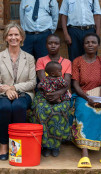Team Europe in Malawi marks Green Diplomacy Week with project site visits

On Monday 10 November, the Productive Use of Energy Roadmap was launched, developed by the Renewable Energy Industry Association of Malawi (REIAMA) and with support from German cooperation (GIZ). EU Ambassador Daniel Aristi Gaztelumendi together with the Head of Cooperation and Deputy of the German Embassy, Mr Andreas Hartmann, emphasized that renewable energy solutions – with emphasis on solar energy – are key to enhancing climate resilience within local communities and expanding energy access, including in the most remote areas, e.g. through the use of solar-powered water pumps for irrigation.
In this context, Ambassador Aristi Gaztelumendi recalled the EUR Million 500 EU Energy Package for Malawi. This programme is designed to support Malawi’s energy ambitions through significant investments in expanding and rehabilitating critical energy infrastructure, notably by financing the Mpatamanga Hydropower Station on the Shire River.

EU in Malawi
On Friday 14 November, Ambassador Aristi Gaztelumendi, together with Irish Ambassador to Malawi Kate Brady and representatives from Germany, France and Flanders joined communities in Dedza District in appreciating the efforts of the communities to reforest the area and develop environmentally friendly energy sources. The EU representatives were explained by the locals how trees are properly planted and watered – and were then each given a quintessentially Malawian hoe, to practice how to dig pits for tree planting.
The EU and Malawi work together on climate and environment through programmes like Ulimi ndi Chilengedwe m’Malawi, known as UCHI – “Greening and Growing Malawi” – (EUR 56.5 million). In Dedza, just south of the capital Lilongwe, the EU partners with Dedza District Council and its technical partner Centre for Applied Systems Analysis (CASA) in the EcoRevive initiative, which is financed under the umbrella of the UCHI programme, and that aims to restore the Mua-Livulezi landscape, help secure land registration, provide community livelihoods like beekeeping and eco-tourism, and build long-term climate resilience for the communities living around this forest reserve.
More globally, the week also presented an opportunity to highlight the collaborative efforts of the European Union and partners across the globe in the ongoing Climate Change Conference of the Parties (COP30) in Brazil. The European Union is on track to become the first ever carbon neutral continent by 2050.
The Green Diplomacy Week 2025 in Malawi was then an opportunity to demonstrate our shared commitment to climate action and environmental protection in the spirit of #TeamEurope, which brings together all the Member States of the European Union and the European institutions for a maximum positive impact. A big thanks to all EU in Malawi colleagues and EU Member States’ colleagues who contributed to organising this inspiring programme!





